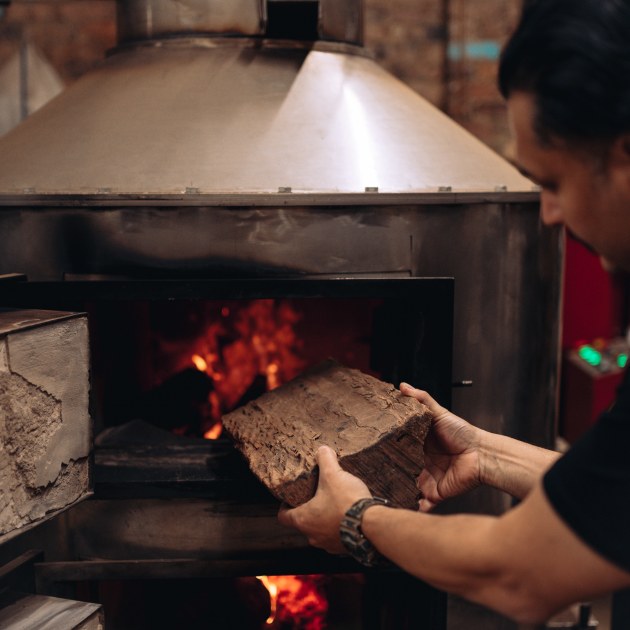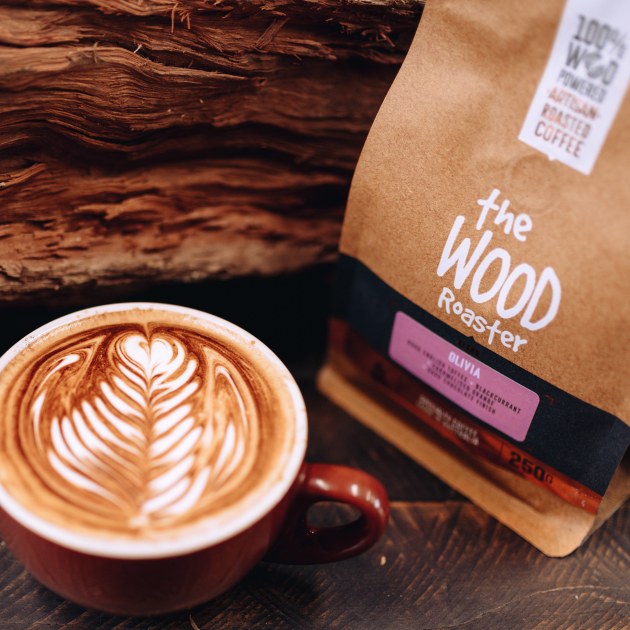When Kim Loupis from The Wood Roaster was looking for a way to make his coffee stand out in a crowded market, he ended up looking to the past and throwing a log on the fire. Jan Arreza writes. This article was first published in Food & Drink Business April 2021.
Speciality coffeehouse The Wood Roaster is drawing upon the old traditions and principles of wood-fired artisan roasting and combining it with a new custom-built, temperature-controlled air roaster with data logging technology.
The fire and air creation came about when founder Kim Loupis was looking to make his coffee stand out in a crowd where everyone had been using the same equipment and methods for years. He decided to look to the past for inspiration.
“Starting off in a café in Darlinghurst, Sydney, I began to see that everyone was just doing the same thing and using the same products. I wanted to have a point of difference in the marketplace and do things that no one else was doing,” explains Loupis.
“Back in the old days, they used to have the furnace directly underneath the roasting drum, but they were never able to control the temperature. It was a case of just throw everything in and hope for the best.”
Loupis was hooked. “This was the traditional way they made coffee, and this unique and artisan process delivered a more crisp and enhanced flavour profile.”
And his quest began, researching and reading everything he could on wood fire roasting to ultimately design a custom-built coffee roasting machine. The result is The Wood Roaster, the only wood roasted coffee company in Australia with the only set-up of its kind in the world.
“I settled on a machine with a separate furnace that is an air roaster. It doesn’t produce smoke, so the flavour isn’t affected.
“It also has a control system for the temperature, which we can run from the computer to the exact temperature degree we want,” he explains.
The Wood Roaster uses the dry heat from the wood roasting machine to caramelise its beans. It delivers “a cleaner, sweeter and full bodied” result compared to using a gas roaster, Loupis says.
For The Wood Roaster account manager Melissa Johnson, the stand-out feature of the roasting machine is its consistency and the flavour profiles it delivers.

Johnson has worked in the industry for more than 20 years and has been with the business since the very beginning.
“Because of the computerised technology, it is as simple as logging the necessary details in. We pull up the roasting profile for a specific bean and once it is set, the roaster will go to the exact degree set for every single blend. And every single bean will come out the same,” Johnson explains.
It takes just six seconds to roast a bean to perfection, she says.
“It brings out the next level of uniqueness to our flavour profiles. We are bringing back the old traditions, but with the added benefit of today’s technology.”
The company offers single origin beans including Yirgacheffe; Guatemala Pachaya Volcanic; Rwanda Coco Honey & Peaberry; Colombia Finca Alto Bonito; and Brazil Bela Epoch.
But its blends are the result of internal collaboration, normally between Loupis and roaster Satin Rau, who work side by side to create various blends. Once formulated, a team testing phase begins for further edits, then to clients and then customers.
Enviro friendly
The family-owned business also prides themselves on following strict environmental and sustainable practices.
The factory runs on 100 per cent solar power and the timber it uses is sourced from a sustainable forest in Queensland. For every tree that gets cut down, another three are planted in its place.
Moisture in the wood is removed by airing in The Wood Roaster’s warehouse. This means the coffee house only burns dry aged timbers.
The company has also installed a second catalytic after-burner to its roasting system, to further mitigate emissions and by-product.
“The challenge at the beginning was trying to find the right timber. After trying a few different types of wood we decided on ironbark that comes from a sustainable forest in mid North Queensland,” explains Loupis.
“The reason that we use vintage timber is it produces extreme dry heat that makes roasting our beans to perfection easy and also produces no smoke to influence the flavour. This is due to the heat from the wood and afterburners on our roaster.

“Once the temperature is set the technology takes over, monitoring and controlling the temperature to the exact degree. That allows it to vent when it needs to be, and then discharge the beans at desired temperature so we get our perfect roast every time.
“One of the most important parts of coffee roasting is consistency; each and every cup of coffee must be perfect.”
Expansion plans
Never one to rest of his laurels, Loupis says the company will continue to invest in more machines and technology to help with their day-to-day operations and growth plans to take the brand into other states.
The Wood Roaster currently supplies around 60 cafés.
Loupis has just installed new plug and chain automation, also custom built. It allows coffee to be moved around the factory from the roaster to the mixer, without damaging the bean.
“We also had a new floveyor conveying system installed recently. It is a system that has never been used with coffee production before. It looks like a little version of Willy Wonka’s chocolate factory with everything going on,” Loupis says.
“The best advantage of having this system is that our staff do not have to touch or unload the beans and reload them into the mixer, which is all automated.
“This saves our staff from lifting, which is obviously beneficial their health and wellbeing, but it also saves roughly about a day’s work and quite a bit of money on our operations.”
Expansion into other markets is also on the cards, with Brisbane being earmarked as the next state to move into within the next year or two.
“One of the reasons we are looking at Brisbane is because we’ve had a lot of potential customers from there call us wanting our products,” Loupis adds.
“They are looking for a unique product that will wow their customers. It is a different market up there, but they are all about the flavour and love what we are all about.”
The company says they will continue to bring in new high-end coffee beans for its clientele, including geishas or microlots and other unique beans that are hard to come by.
“We are always looking for the unique microlots and geisha products that we can offer to our customers for retail and wholesale,” Loupis says.
“Primarily, when creating a blend, we want to look for different characteristics that come from each different bean and how those profiles work together to create unique flavours for each blend to make it special, which is a process that can take weeks or months.”
For a coffee roaster with fire under his coffee beans, that is time well spent.





